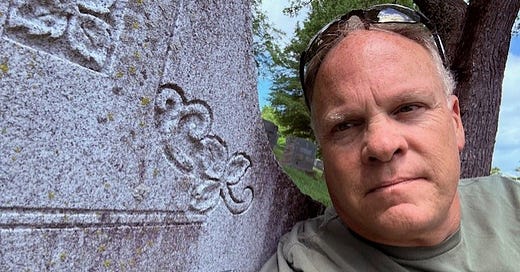We say too much to our children.
Down to their most recent bite.
"How was it?"
Before they've swallowed.
Parents can be difficult for children of any age to digest because we too often rely on constant verbal instruction, correction, and (over) explanation—all stated in reminders that it's for them.
But it's not.
For them -- less is more, more often than not.
We tell them what not to do when our example leads the way instead. We tell them what's happening, what to expect, and what we expect from them when it's their processing of the moment and the moments to come that most help them learn to stand on their own. We fill the silence with nervous chatter posed as wisdom for life when the quietness holds the answers they seek.
I made this mistake with my late son, dear William, more than I'm comfortable admitting. I had dreams for William, the first-born of our three -- everything he should do.
Based on everything, I didn't.
Do as you want, son.
I should have said that, adding that what matters most is who you are and how you do it -- as you do. As you want.
William kept a journal in treatment for substance misuse. He'd gone there not long after graduation from college after substance misuse had taken over. He was in the early stages of thinking and speaking for himself. We found his journal when we found him dead from an accidental overdose, and he'd written how I'd made most of his decisions in life to that point for him.
It's true.
I'd said too much when I'd needed to speak less and show more strength as a father and role model, giving him a north star to follow, not my version of how he could chase the north star and catch it if he worked hard enough, if he did, what I said.
Too much becomes enough when they stop listening, but that happens more often than most parents would like to admit. It's hard for them to hear the gems of what we want to convey amid too much noise.
For instance, I talked to William about substance misuse more times than I recall from middle school onward but creatively mapped out his future with him alongside me as I consumed wine, and he followed that path.
The father's chatter and the father's example -- when he needed instead to find the words, and way, himself.
I learned the hard way, with the loss of a child and regret, how less is more when it comes to what we say, but more is better when modeling by example, standing alongside them with consistency, love, and strength, and giving them space to speak. So, I'm still surprised, after years of helping other young men and their families better communicate years after my son's last breath, how and why they turn to me.
Don't you know? That's what I want to ask them. But the truth is, they aren't wrong. This father knows best now: Help isn't hard to give when you speak less, but when you focus more on what matters and stand with a genuine strength they'd like to emulate alongside and with them.
Most parents and children can relate because we've all been talked to too much, and most of us as parents have spoken.
Too much for me died when I found William. There wasn't much more to say but three words.
I love you.
While I still share unsolicited advice with my two adult children, I say less than I did and work to ask questions and advice of them in return and ensure that, if nothing else, they know.
I love them more than anything I need to say.
All of us parents and children feel that way -- it's hard to say less when all we want for them is so much more. That's why a recent social media post I made about visiting William's grave on the 12th anniversary of his death received such a strong response. I'd not visited the cemetery where he's buried in a couple of years, and I found myself approaching on a warm spring day with flowers in full bloom, thinking of everything I needed to say, update, and explain to my son that had happened in the seasons since.
But by the time I arrived and wrapped my arms around his grave marker, which had darkened with lichen yet shimmered in the sunlight as a beacon that pulled me in and showed the way, I had only tears and three words to say.
"I love you," I said.
It was the foundation of a parent’s timeless storybook—the first and last chapters. The only words we speak to our children that truly matter. The only words we say that never die.
I’d wasted so many words with William. But standing at his grave a decade after his death, I understood at last what he’d been teaching me all along: with children, less is often more.
So that day, I gave him only those three words and let him answer in the language of the new season emerging—the rustle of leaves and pollen swirling in the sunlit breeze.
I drove away in silence, grateful for the quiet where growth begins—where we say less and learn to listen.




